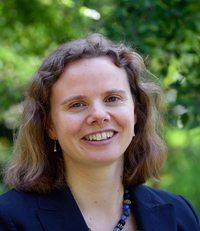Tessa Quax en Casper van der Kooi ontvangen subsidie van Human Frontier Science Program
Prof. dr. Tessa Quax en dr. Casper van der Kooi hebben onlangs een Human Frontier Science Programme (HFSP) subsidie ontvangen. Quax ontvangt een HFSP Early Career Research Grant ter waarde van 1,5 miljoen dollar voor het project ‘Unraveling the multi-layer relationship between archaeal symbionts and their viruses’. Van der Kooi ontvangt een HFSP Program Grant ter waarde van 1,2 miljoen dollar voor zijn project ‘Shiny signaling: the production, detection and neurobiological processing of brilliant colors’. Beide onderzoekers zijn coördinator van de projecten.
HFSP-subsidies bieden drie jaar ondersteuning voor internationale teams waarbij ten minste twee landen betrokken zijn. De voorkeur gaat uit naar intercontinentale samenwerkingen. Early Career Grants zijn voor aanvragers die zich binnen vijf jaar na oprichting van hun onafhankelijke onderzoeksgroep en niet meer dan tien jaar na hun doctoraat bevinden. Program Grants doen een beroep op het innovatieve en creatieve potentieel van onderzoeksteams.

Prof. dr. Tessa Quax | HFSP Early Career Research Grant
Project: Ontrafelen van de complexe relatie tussen archaeale symbionten en hun virussen
Tessa Quax, onderzoeker bij het Groningen Biomolecular Sciences and Biotechnology Institute (GBB), gaat onderzoek doen naar virussen die micro-organismen genaamd archaea infecteren. De archaea voor dit project zijn geïsoleerd uit hete bronnen in Japan, waar ze bij temperaturen van ~80° Celsius samen met hun partner archaea in symbiose leven. Dit betekent dat beiden elkaar nodig hebben om te groeien. Deze archaea zijn verwant met het eerste cellulaire leven op aarde en worden gezien als de voorouders van mensen, planten en dieren. Net als mensen, kunnen ook deze micro-organismen geïnfecteerd worden door speciale virussen. In dit project wordt samen met partners uit Japan, Australië en de VS onderzocht welk effect virusinfectie heeft op de symbiose. Dit is belangrijk om het functioneren van symbiotische micro-organismen in verschillende voedselketens en ecosystemen te begrijpen.

Dr. Casper van der Kooi | HFSP Program Grant
Project: Glanzende signalen: de productie, detectie en neurobiologische verwerking van briljante kleuren
Casper van der Kooi is onderzoeker bij het Groningen Institute for Evolutionary Life Sciences (GELIFES). Zijn project gaat over hoe glanseffecten van bloemen en vlinders bijdragen aan de zichtbaarheid. Verreweg de meeste kleuren in de natuur zijn mat; planten en dieren met een matte kleur zien er van alle kanten hetzelfde uit. Echter verscheidene dieren (bijvoorbeeld de vleugels van vlinders, het schild van kevers en de veren van de pauw) en bloemen (bijvoorbeeld boterbloemen en orchideeën) hebben een karakteristiek glimmende kleur, die vooral in de zon goed zichtbaar is. Het feit dat deze glanseffecten zo vaak zijn geëvolueerd (zie afbeelding 2 hieronder) suggereert dat ze een (visuele) functie hebben. Waardoor komt die glans tot stand, hoe wordt het waargenomen en wat is het belang van glans voor de zichtbaarheid voor potentiële partners of bloembezoekers? Dit project onderzoekt de optische eigenschappen van glimmende bloemen en dieren, de neurobiologische verwerking van flitseffecten in het insectenbrein (met Prof. Kinoshita, Japan) en de bijdrage van glanseffecten aan de zichtbaarheid in het wild (met Prof. Kemp, Australië).
Human Frontier Science Program
Het Human Frontier Science Program is een financieringsprogramma voor grensverleggend onderzoek in de levenswetenschappen. Het wordt uitgevoerd door de International Human Frontier Science Program Organization (HFSPO) met kantoor in Straatsburg.


Meer nieuws
-
29 januari 2026
Microplasticonderzoek - opgeblazen nieuws of een echt gevaar?
-
27 januari 2026
ERC Proof of Concept grant voor Maria Loi
